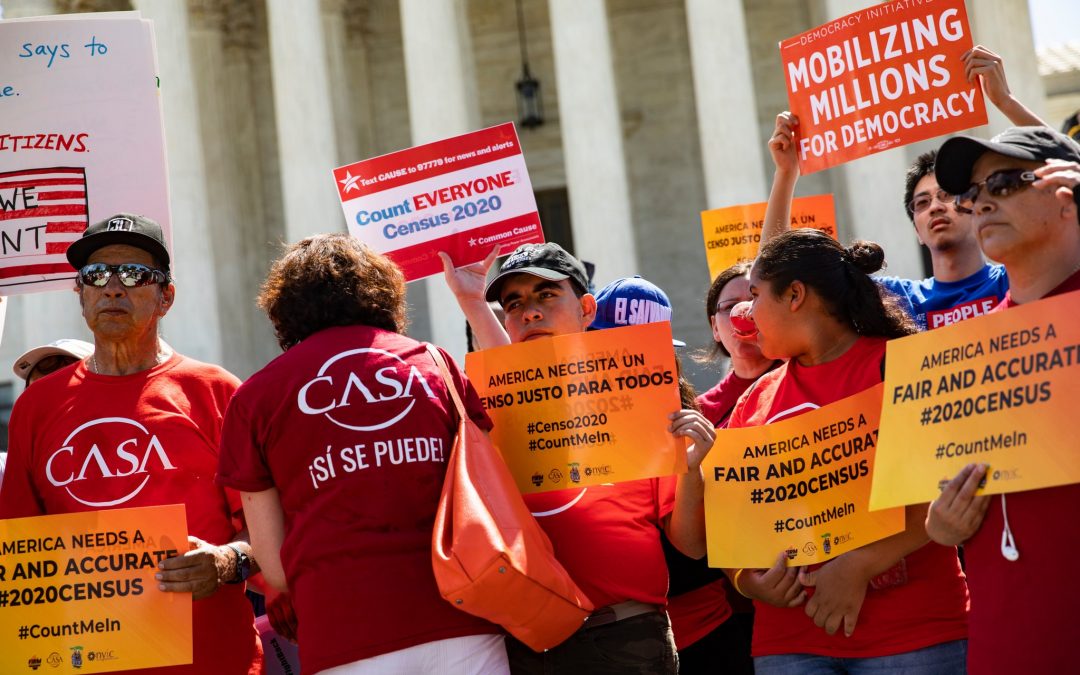In a setback for the Trump administration, the Supreme Court today rejected its stated reason for adding a question on citizenship to the census, leaving in doubt whether the question would appear on the census forms sent to every household in the nation next year.
Chief Justice John Roberts, writing for the majority, said the explanation offered by the Trump administration for adding the question “appears to have been contrived.”
But he left open the possibility that it could provide an adequate answer.
Executive branch officials must “offer genuine justifications for important decisions, reasons that can be scrutinized by courts and the interested public,” the chief justice wrote. “Accepting contrived reasons would defeat the purpose of the enterprise. If judicial review is to be more than an empty ritual, it must demand something better than the explanation offered for the action taken in this case.”
The practical impact of the decision was not immediately clear.
While the question is barred for now, it is at least possible that the administration will be able to offer adequate justifications for it.
But time is short, as the census forms must be printed soon.
Trump commented on Twitter, writing that he had “asked the lawyers if they can delay the Census, no matter how long, until the United States Supreme Court is given additional information from which it can make a final and decisive decision on this very critical matter.”
The decision was fractured, but the key passage in the chief justice’s majority opinion was joined only by the court’s four-member liberal wing.
Roberts wrote that executive branch officials ordinarily have broad discretion to make policy judgments.
But he said the record in the case demonstrated that Wilbur Ross, the commerce secretary, had not given a full and accurate account of his decision to add the question.
In sworn testimony before Congress, Ross said he had decided to add the question “solely” in response to a Justice Department request in December 2017 for data to help it enforce the Voting Rights Act, or the V.R.A.
Three federal trial judges have ruled that the evidence in the record demonstrated that Ross was not being truthful.
Roberts wrote that the evidence in the case showed that “the V.R.A. played an insignificant role in the decision-making process.”
Instead, the chief justice wrote, Mr. Ross had tried hard to find a rationale for adding the question.
“The secretary,” Roberts wrote, “was determined to reinstate a citizenship question from the time he entered office; instructed his staff to make it happen; waited while commerce officials explored whether another agency would request census-based citizenship data; subsequently contacted the attorney general himself to ask if D.O.J. would make the request; and adopted the Voting Rights Act rationale late in the process.”
“Altogether,” the chief justice wrote, “the evidence tells a story that does not match the explanation the secretary gave for his decision.”
The trial judge in the case had given the administration another chance to provide an explanation, and the Supreme Court affirmed that ruling.
“In these unusual circumstances,” Roberts wrote, “the district court was warranted in remanding to the agency, and we affirm that disposition.”
“We do not hold that the agency decision here was substantively invalid,” the chief justice wrote. “But agencies must pursue their goals reasonably. Reasoned decision-making under the Administrative Procedure Act calls for an explanation for agency action. What was provided here was more of a distraction.”
Justices Ruth Bader Ginsburg, Stephen G. Breyer, Sonia Sotomayor and Elena Kagan joined the key part of the chief justice’s opinion.
In dissent, Justice Clarence Thomas said the majority had done something extraordinary.
“For the first time ever,” he wrote, “the court invalidates an agency action solely because it questions the sincerity of the agency’s otherwise adequate rationale.”
Justices Neil Gorsuch and Brett Kavanaugh joined Justice Thomas’s partial dissent.
Thomas said the courts should give executive branch officials the benefit of the doubt.
“I do not deny,” he wrote, “that a judge predisposed to distrust the secretary or the administration could arrange those facts on a corkboard and — with a jar of pins and a spool of string — create an eye-catching conspiracy web.”
He said the consequences of the majority decision would be far-reaching.
“Now that the court has opened up this avenue of attack,” he wrote, “opponents of executive actions have strong incentives to craft narratives that would derail them.”
Since 1950, the government has not included a question about citizenship in the forms sent to each household.
The census, the nation’s largest peacetime mobilization, is overseen by the Commerce Department.
In March 2018, Wilbur Ross, the commerce secretary, announced that he planned to add a citizenship question.
He acknowledged that it could have “some impact on responses” but said the information sought was “of greater importance than any adverse effect that may result from people violating their legal duty to respond.”
Documents disclosed in the case showed that Ross had discussed the citizenship issue early in his tenure with Stephen Bannon, the former White House chief strategist and an architect of the Trump administration’s tough immigration policies, and that Ross had met at Bannon’s direction with Kris Kobach, the former Kansas secretary of state and an opponent of unlawful immigration.
After the justices heard arguments in April, more evidence emerged from the computer files of Thomas Hofeller, a Republican strategist. It suggested that the Trump administration sought to collect citizenship information so that states could draw voting districts by counting only eligible voters rather than all residents, as is the current practice.
That would, Hofeller wrote, “be advantageous to Republicans and non-Hispanic whites.”
The administration has said that census forms must be printed by June, but the groups challenging the citizenship question said the real deadline is October, leaving time for further legal proceedings.
